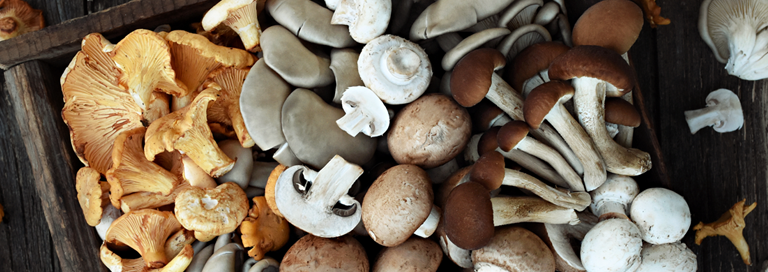In a new study using data collected from more than 24,000 Americans, researchers at Penn State found that eating mushrooms every day dramatically lowers your risk of developing depression.1
This is great news, especially now…
You see, the stress and uncertainty of the last couple of years has dramatically increased the number of people suffering the emotional impacts caused by Covid.
In fact, the number of Americans who say they are depressed has tripled since the start of the pandemic.2
As a result, traditional doctors are prescribing medications like Prozac and Zoloft in record numbers. But these pills don’t often work. Almost half of the patients taking a Big Pharma antidepressant say they still suffer symptoms of depression.
And then there are the side effects connected with these powerful pills, including insomnia and fatigue, weight gain, anxiety, feeling numb or disconnected, dizziness, and sexual dysfunction
I don’t prescribe antidepressants. Instead, I use natural options to help my patients.
And now I can add mushrooms to that list.
Mushrooms are a great source of ergothioneine. This amino acid acts as an antioxidant in your body. Because ergothioneine can pass through the blood-brain barrier, it’s able to protect your brain against inflammation and oxidative stress.3,4,5
The latest research shows that both oxidative stress and inflammation play a key role in the development of depression.6
Your body can’t make ergothioneine on its own, so you have to get it from food. And no food contains more than mushrooms.
One serving of mushrooms – one cup raw or one-half cup cooked – contains up to 5 mg of ergothioneine. I recommend eating porcini, King oyster, maitake, oyster or shiitake mushrooms daily.
Earlier research from the Penn State researchers found that eating just five mushrooms a day is enough to prevent depression.7
But mushrooms help
protect you from depression in another important way…They are a rich source of vitamin D.
If you are a regular reader, you know that vitamin D helps beat depression by boosting the production of the “feel-good” neurotransmitter serotonin. In fact, vitamin D can boost serotonin up to 30 times.8
Unfortunately, more than 90% of Americans don’t get enough vitamin D.
Fresh wild mushrooms like chanterelle or morels have the highest vitamin D content. But you can easily boost the amount of vitamin D in your mushrooms by drying them in the sun.
I read a book a few years ago called Mycelium Running: How Mushrooms Can Help Save the World by Paul Stamets. He knows so much about the health benefits of mushrooms that he’s an advisor of integrative medicine at the University of Arizona Medical School.
Stamets did a study where he picked shiitake mushrooms that had been grown indoors and placed them gills-up in the sunlight for six hours. Their vitamin D content shot up from around 110 IU of vitamin D per 100 grams to a pretty remarkable 46,000 IU.
Make sun-dried mushrooms easily at home
Drying and storing the mushrooms is easy to do.
-
- Gather fresh organic mushrooms from a local produce stand. Gently remove dirt with a dry cloth.
- Spread your mushrooms in the sun on a piece of parchment paper during the sunniest time of the day.
- Bring them in at night or when the sun goes down to avoid moisture.
- Then repeat the drying process the next day. But don’t dry your mushrooms any more than two days. Over-exposure to UV rays can cause levels of vitamin D to drop.
- Store your thoroughly dried mushrooms in a dark glass container.
- Add a spoonful of rice to keep the mushrooms dry, and seal it up.
The mushrooms should be good for at least a year. Then you can eat a few mushrooms to get a good start on the vitamin D you’ll need for the day.
To get the 5,000 IU a day of vitamin D that I recommend, you’d need to eat 10 grams – about an eighth of a cup – of sun-dried mushrooms daily.
To Your Good Health,

Al Sears, MD, CNS
References:
1. Ba DM et al. “Mushroom intake and depression: a population-based study using data from the U.S. National Health and Nutrition Examination Survey (NHANES) 2005-2016.” J Affective Disord. 2021; 294:686-692. doi: 10.1016/j.jad.2021.07.080.
2. Ettman CK et al. “Persistent depressive symptoms during COVID-19; a national, population-representative, longitudinal study of U.S. adults.” Lancet 2022;5:10091.
3. Nagaro M, et al. “Reduction of depression and anxiety by 4 weeks Hericium erinaceus intake.” Biomed Res. 2010;31(4):231-237.
4. Okamura H, et al. “The effects of Hericium erinaceus (Amyloban® 3399) on sleep quality and subjective well-being among female undergraduate students: a pilot study.” Personalized Med Univ. 2015;4:76-78.
5. Feeney MJ. et al. “Mushrooms and health summit proceedings.” J Nutr. 2014; 144(7):1128S-1136S.
6. Bakunina N, et al. “Immune mechanisms linked to depression via oxidative stress and neuroprogression.” Immunology. 2015 Mar; 144(3): 365–373.
7. Ma BJ. “Hericenones and erinacines: stimulators of nerve growth factor (NGF) biosynthesis in Hericium erinaceus.” Mycology. 2010;1(2):92-98.
8. Patrick P, et al. “Vitamin D hormone regulates serotonin synthesis. Part 1: relevance for autism.” FASEB J. 2014 Jun;28(6):2398-413.

